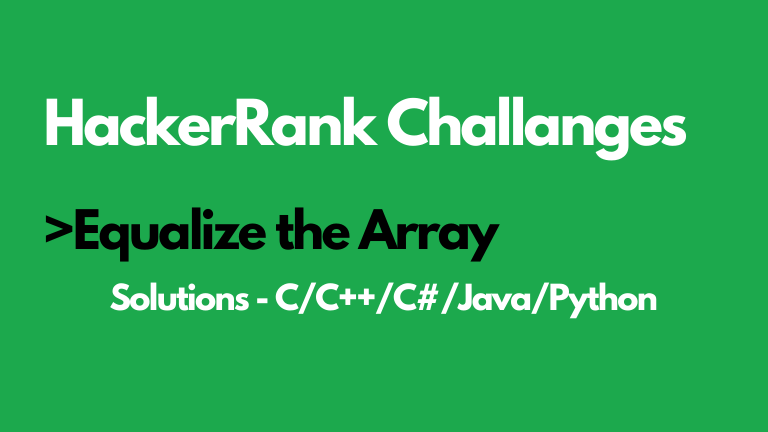Given an array of integers, determine the minimum number of elements to delete to leave only elements of equal value.
Example
Arr = [1,2,2,3]
Delete the 2 elements 1 and 3 leaving arr=[2,2]. If both twos plus either the 1 or 3 are deleted, it takes 3 deletions to leave either [3] or [1]. The minimum number of deletions is 2.
Function Description
Complete the equalizeArray function in the editor below.
equalizeArray has the following parameter(s):
- int arr[n]: an array of integers
Returns
- int: the minimum number of deletions required
Input Format
The first line contains an integer , the number of elements in arr.
The next line contains space-separated integers arr[i].
Constraints
- 1<=n<=100
- 1<=arr[i]<=100
Sample Input
STDIN Function ----- -------- 5 arr[] size n = 5 3 3 2 1 3 arr = [3, 3, 2, 1, 3]
Sample Output
2
Equalize the Array HackerRank Solution in C
#include <stdio.h>
#include <string.h>
#include <math.h>
#include <stdlib.h>
int main() {
int i,n,l;
scanf("%d",&n);
int arr[n];
for(i=0;i<n;i++){scanf("%d",&arr[i]);}
int brr[101]={0};
for(i=0;i<n;i++){brr[arr[i]]++;}
l=0;
for(i=0;i<101;i++){
if(brr[i]>l){l=brr[i];}
}
printf("%d",n-l);
return 0;
}
Equalize the Array HackerRank Solution in C++
#include <bits/stdc++.h>
using namespace std;
#define DEBUG(x) cerr << #x << " = " << x << endl
#define INPUT freopen("Data.inp", "r", stdin)
#define OUTPUT freopen("Data.out", "w", stdout)
typedef long long LL;
typedef pair<int, int> II;
typedef vector<int> VI;
const int N = (int) 1e2 + 10;
int n, a[N], c[N];
int main() {
#ifdef LOCAL
INPUT;
OUTPUT;
#endif
scanf("%d", &n);
for (int i = 1; i <= n; ++i) scanf("%d", &a[i]);
for (int i = 1; i <= n; ++i) c[a[i]]++;
printf("%d", n - *max_element(c + 1, c + 101));
return 0;
}
Equalize the Array HackerRank Solution in Java
import java.io.*;
import java.util.*;
import java.text.*;
import java.math.*;
import java.util.regex.*;
public class Solution {
public static void main(String[] args) {
Scanner sc = new Scanner(System.in);
int n = sc.nextInt();
int[] counts = new int[101];
for (int i = 0; i < n; i++) {
counts[sc.nextInt()]++;
}
Arrays.sort(counts);
System.out.println(n-counts[100]);
}
}
Equalize the Array HackerRank Solution in Python
from collections import Counter n = input() A = map(int,raw_input().strip().split()) cts = Counter(A) print n-max(cts.values())
Equalize the Array HackerRank Solution in C#
using System;
using System.Collections.Generic;
using System.IO;
class Solution {
static void Main(String[] args) {
int t = Convert.ToInt32(Console.ReadLine());
string[] a_temp = Console.ReadLine().Split(' ');
int[] a = Array.ConvertAll(a_temp,Int32.Parse);
int[] counts = new int[101];
for (int i = 0; i < t; ++i) {
counts[a[i]]++;
}
int maxValue = 0;
for (int i = 0; i < 101; ++i) {
maxValue = Math.Max(maxValue, counts[i]);
}
Console.Out.WriteLine(t - maxValue);
}
}
Attempt Equalize the Array HackerRank Challenge
Link – https://www.hackerrank.com/challenges/equality-in-a-array/
Aayush Kumar Gupta is the founder and creator of ExploringBits, a website dedicated to providing useful content for people passionate about Engineering and Technology. Aayush has completed his Bachelor of Technology (Computer Science & Engineering) from 2018-2022. From July 2022, Aayush has been working as a full-time Devops Engineer.

